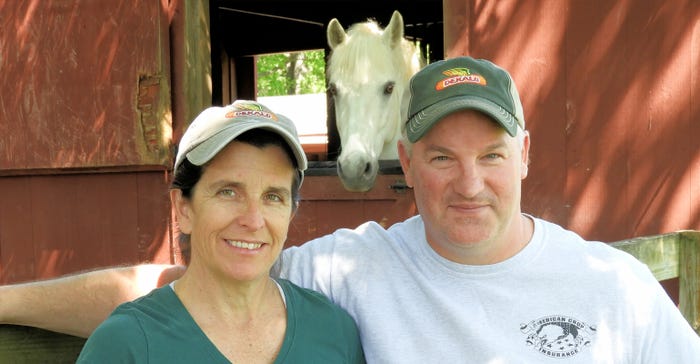
Not everyone would see a national motocross competition as a grooming ground for operating a farm. But aside of the mud and spills, the competition as a teenager and young adult helped prepare Scott Clucas for his ultimate challenge to come.
His father passed away suddenly and left working the northern New Jersey family farm to the 28-year-old — in one of the farm's few drought years. "It made me a man quickly," he recalls.
Scott met his wife, Patty, while she was working at a country store. After growing up in a New York City suburb and finishing college, she moved out to the country to work with horses. They married in 2000, and today they're partners in Clucas Farms, LLC. Computer-savvy Patty handles the bookkeeping; Scott handles everything else.
 BIZ PARTNERS, TOO: Patty and Scott Clucas share a love for farming and horses.
BIZ PARTNERS, TOO: Patty and Scott Clucas share a love for farming and horses.

At first, the Clucases struggled financially and benefitted with Farm Service Agency loans. Gradually, Scott enlarged his farming base, developed a hay and straw marketing niche that has well-served the business, and worked down the company's debt-load.
He started farming with 1,500 acres of mostly rented land. Today, Clucas Farms owns 380 acres — expensive real estate about an hour west of NYC's Time Square. Leased acreage has grown to 4,200 acres, committed to intensely rotated corn, soybeans, wheat, oats and hay crops.
Equipped for success
Having two of almost every piece of farm machinery is a necessity for this business. Scott zealously aims to pay off new machinery debt in as little as one year. Having nine full-time employees and a well-used shop helps maintain farm equipment, straight trucks and three semi-trailers for grain and hay hauling — and helps reduce machinery debt.
He credits the farm's success to luck, hustle, good workers, and technologies that boost yields and machine efficiencies. Farming land in four counties requires a mix of no-till and minimum till. Grain crop fields are mapped for using GPS-based systems to guide fertility, seeding rates and yield analysis.
Two grain dryer facilities, including a new high-efficiency dryer and grain leg, can now handle 900 bushels an hour. Corn, soybeans, wheat and oats from more than 3,400 acres can be stored in more than 330,000 bushels of on-farm grain storage.
More than 1,000 acres of orchard grass, brome and timothy feed northern New Jersey's equine industry. The farm's automated stack-and-store hay bale accumulators can pack nearly 9,000 small square bales a day during peak season.
Clucas Farms markets more than 115,000 bales of hay and 25,000 bales of straw annually. While the farm relies on liquid fertilizer, some of that hay and straw comes back as manure and litter from neighboring farms to be spread and help maintain soil organic matter levels.
Scott Clucas, ag advocate
• Location: Califon, Hunterdon County, N.J.
• Family: Scott and his wife, Patty, have two teenagers, Fred and Katie. Both youths help out on the farm and are learning the ropes.
• Leadership roles: Scott is as passionate about ag community service as he is about farming. He's currently president of New Jersey State Grain and Forage Producers Association, and is the former vice chair for the state caucus board. A New Jersey Farm Bureau member, Scott was also the past president of Hunterdon County Board of Agriculture, and he still serves on the board. He also serves on the Tewkesbury Township Ag Advisory committee.
Following in his parents' footsteps, Scott has hosted an open house and tour during fall to help educate the surrounding community about agriculture and grain farming. On the non-ag side, he has even served as a youth wrestling coach. The community involvement and farming excellence have earned him Hunterdon County's Distinguished Farmer of the Year and Farm Credit's Outstanding Young Farmer awards.
Notable: This spring, an 80-by-200-foot storage barn was erected atop a grassed, rolling 60-acre tract. To the Clucases' daughter's delight, the hillside also was perfect for designing an equine cross country course. About 50 yearly visitors pay a $60 fee each time they come to practice.
About the Author(s)
You May Also Like




